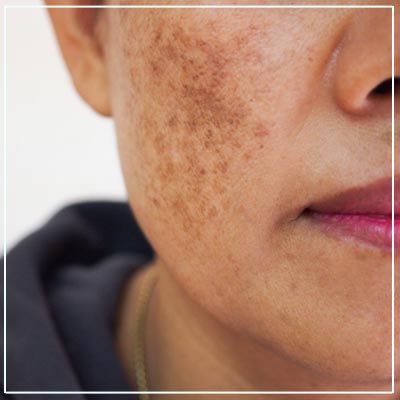Yes, skin pigmentation can be treated, but the specific approach depends on the type of pigmentation, its cause, and individual factors. Here are some common treatments for different types of skin pigmentation:
- Topical Treatments: Lightening Creams: Prescription or over-the-counter creams containing ingredients like hydroquinone, retinoids, kojic acid, or vitamin C can be used to lighten hyperpigmentation.
- Chemical Peels: Chemical peels involve applying a chemical solution to the skin, which exfoliates the outer layer and can improve pigmentation irregularities. This is commonly used for sunspots and uneven skin tone.
- Laser Therapy: Lasers and intense pulsed light (IPL) devices can target and break down excess pigment in the skin. They are effective for conditions like age spots, sun damage, and certain types of birthmarks.
- Microdermabrasion: Microdermabrasion uses a device to gently exfoliate the outer layer of the skin, promoting the growth of new, more evenly pigmented skin.
- Cryotherapy: Cryotherapy involves freezing the pigmented area with liquid nitrogen, causing the darkened skin to peel away. This is often used for certain types of pigmented lesions.
- Topical Steroids: In some cases, topical steroids may be prescribed to reduce inflammation and lighten hyperpigmentation.
- Micro needling: Micro needling involves the use of a device with fine needles to create tiny punctures in the skin, promoting collagen production and improving the appearance of pigmentation.
- Cosmetic Camouflage: Makeup or camouflage creams can help conceal pigmentation irregularities, providing a temporary solution.
- Oral Medications: In certain cases, oral medications may be prescribed, especially for conditions like melasma. These may include medications that regulate pigmentation or hormones.
- Sun Protection: Preventing further pigmentation is crucial. Regular use of sunscreen with a high SPF helps protect the skin from harmful UV rays, preventing the worsening of pigmentation and reducing the risk of new pigmented lesions.
It’s important to note that the effectiveness of treatment can vary based on the cause and type of pigmentation, as well as individual factors. Some conditions may require ongoing maintenance treatments, and results may take time to become apparent.
Individuals considering pigmentation treatment should consult with a dermatologist or a qualified skincare professional. They can provide a thorough assessment, identify the specific type of pigmentation, and recommend a tailored treatment plan based on the individual’s skin type and needs.
Are you seeking expert care for your skin concerns? Dr. Deepam Shah, acclaimed as the leading Skin Specialist in Mumbai, is dedicated to enhancing your skin health and confidence.


